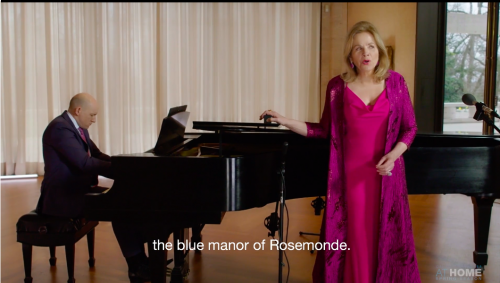 United States ‘Music and the Mind’: Renée Fleming (soprano), Robert Ainsley (piano), Ehud Isacoff (neuroscience). Recorded at the Kreeger Museum, Washington, DC., 16.3.2021, for Cal Performances at Home. First streamed on 29.4.2021 and available to 28.7.2021. (HS)
United States ‘Music and the Mind’: Renée Fleming (soprano), Robert Ainsley (piano), Ehud Isacoff (neuroscience). Recorded at the Kreeger Museum, Washington, DC., 16.3.2021, for Cal Performances at Home. First streamed on 29.4.2021 and available to 28.7.2021. (HS)

Handel – ‘Calm thou my soul’ from Alexander Balus, ‘To fleeting pleasures’ from Samson
Wolf – ‘Die Spröde’, ‘Mignon III’ (‘So lasst mich scheinen’)
Fauré – ‘Prison’
Claire Delbos – ‘Dors’
Duparc – ‘Le manoir de Rosemonde’
Gershwin – ‘Fascinating Rhythm’
Tod Machover – ‘VocaGammified’ (world premiere) for soprano, string quartet and Gamma electronics. Based on ‘Gammified’, commissioned by Kronos Quartet as part of the 50 for the Future project. Recording of string quartet used by permission of Kronos Quartet.
This is not your typical soprano recital. Part seminar, part vocal concert, Renée Fleming’s cerebral deep-dive into music and the mind splits its time between a science conversation with neuroscientist Ehud Isacoff, and a series of illustrative songs, arias and the world premiere of a vocal version of a piece written for the Kronos Quartet.
In this one-hour video, streamed by Cal Performances at Home, Fleming sings short works by composers from Handel to Gershwin, fluently and beautifully, of course; and she holds her own in often nerdy but ultimately fascinating back-and-forth with Dr. Isacoff, as they explore connections between songs on her program and his research. The science focuses on ‘the molecular and biophysical basis of the electrical signaling of neurons and the . . . synaptic connections between neurons’, according to a program note.
Aside from her long career as a leading operatic soprano (leavened by stints as a Broadway star and a distinguished association with jazz singing), Fleming also leads the Sound Health initiative in her role as artistic advisor to the John F. Kennedy Center for the Performing Arts, in partnership with the U.S. National Institutes of Health. Under that umbrella she has given presentations on music and the brain around the world, with scientists, doctors and performers, including her 19-episode web series, Music and Mind LIVE, exploring the intersection of music and arts with human health and the brain.

In the first set, Handel’s ‘Calm thou my soul’ from Alexander Balus, unfurls a long-limbed lament, and pairs with ‘To fleeting pleasures’ from Samson, in which Fleming and her piano partner, Robert Ainsley, find a lively bounce. The compositions show how a composer’s response to illness and even early deaths can range from sadness to compensative expressions of joy.
Next up, two songs by Hugo Wolf, especially ‘Mignon III’ (‘So lasst mich scheinen’), center on memory. This gives Fleming and Isacoff a chance to explore how performers deal with memory. Do they remember words differently from music? How does repetition in practice make a performance flow seamlessly?
A French set continues the theme, beginning with ‘Prison’, Fauré’s song on a poem by Paul Verlaine written while serving a prison sentence. In it he describes, from memory, the world outside. Isacoff points out that he created a map from his mind, something our brains do to remember things. Duparc’s ‘Le Manoir de Rosemonde’ tracks a route for a suitor to follow the dying singer across the land to her manor, with the pianist illustrating horses’ hooves contrasting with the singer’s sad world. Fleming’s subtle shifts in tone are especially fine here.
Fleming’s history with jazz makes her romp through Gershwin’s ‘Fascinating Rhythm’ a joy, placing the words in a supple musical frame, playing with rhythm, reserving her ‘opera voice’ for only a few key moments. The science conversation here centers around rhythm’s role in memory, from using it to teach children to using it to recover memories in patients with dementia.
For the final piece Fleming got composer Tod Machover, head of MIT’s Opera of the Future lab, to write a vocal obbligato for his 2019 work for the Kronos Quartet and electronics that center on a low E. Machover’s MIT team discovered that the frequency of this note (40Hz) matches with the gamma brain waves associated with mental sharpness. Playing the tone to mice with Alzheimer’s has reversed the course of the disease, and there’s hope it can be used on humans.
The piece, originally commissioned by Kronos for its 50 For the Future initiative, isn’t quite as fascinating as the story behind it. The electronic drone of the low E gradually sprouts more outgrowths into other tones from the string quartet, a distant cousin of Wagner’s sprouting a whole musical word from low E in the opening measures of Das Rheingold. Fleming’s sinuous soprano line weaves through and atop the quartet’s music, gaining complexity until it comes to rest, harmonizing with the low E at the end. It’s pleasant to hear, even if the music never quite gets anywhere.
But who knows? Maybe it can eventually arrive at a cure for Alzheimer’s.
Harvey Steiman
For more information click here.
